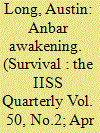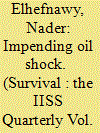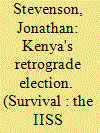| Srl | Item |
| 1 |
ID:
081734


|
|
|
|
|
| Publication |
2008.
|
| Summary/Abstract |
The United States and it allies in Iraq have embraced a tribal strategy to provide security and fight al-Qaeda in Mesopotamia. This approach is not new. Saddam Hussein also sought to use tribal alliances to provide internal security. His experience, and that of the present-day Coalition, demonstrates the prospects and perils of using tribes to provide security. Tension exists between the United States' two main strategic goals of defeating al-Qaeda in Mesopotamia and building a democratic, unified Iraq. There is also the danger that Iraqi tribes will defect from the Coalition in future
|
|
|
|
|
|
|
|
|
|
|
|
|
|
|
|
| 2 |
ID:
081732


|
|
|
| 3 |
ID:
081735


|
|
|
|
|
| Publication |
2008.
|
| Summary/Abstract |
The idea of a soft partitioning of Iraq along ethno-sectarian lines has gained traction in some US policymaking circles. However, the model of an Iraq divided into three ethno-sectarian entities lacks historical resonance and is likely to increase instability in Iraq rather than reduce it. The most persistent trend in Iraqi history since medieval times is the status of Baghdad as a regional proto-capital for an area from the Gulf to the mountains north of Mosul - an area which was frequently referred to by its inhabitants as 'Iraq' from pre-modern times. Conversely, there is no precedent for subdividing the Iraqi territory on the basis of sectarian identities, and Iraq's long history exhibits almost no examples of secessionist movements based on Shia or Sunni ideology
|
|
|
|
|
|
|
|
|
|
|
|
|
|
|
|
| 4 |
ID:
081733


|
|
|
|
|
| Publication |
2008.
|
| Summary/Abstract |
The peak-oil theory asserts that oil production follows a bell-shaped curve, rising exponentially early on, hitting a peak and then declining terminally. As world oil production reaches its peak, energy importers will enjoy somewhat greater political weight; the economic balance of power among major industrial states will change according to their relative abilities to adapt to a scarcity of fossil fuels; and there will be increased risk of state failure, resource conflict and even nuclear-energy-related problems. These dangers might be minimised through national and international programmes designed to rapidly maximise energy efficiency and promote non-fossil-fuel energy sources
|
|
|
|
|
|
|
|
|
|
|
|
|
|
|
|
| 5 |
ID:
081731


|
|
|
| 6 |
ID:
081730


|
|
|
| 7 |
ID:
081738


|
|
|
|
|
| Publication |
2008.
|
| Summary/Abstract |
In 2001 Macedonia's large ethnic Albanian minority revolted against the country's Slav-dominated state. In a victory for transatlantic relations, Europe and the United States worked together to defuse the crisis and avert what could easily have become another Balkan disaster. Since then, there has been progress in rebuilding Macedonia, and the EU deserves credit. This success, however, was predicated on strong US backing and the promise of NATO and EU membership. Although this has made the country something of a political hybrid, Macedonia belongs in NATO, and eventually, the European Union
|
|
|
|
|
|
|
|
|
|
|
|
|
|
|
|
| 8 |
ID:
081736


|
|
|
|
|
| Publication |
2008.
|
| Summary/Abstract |
In May 1998 India surprised the world by testing five nuclear weapons, and despite the pleas of the international community, Pakistan followed suit a few days later. The global effort to halt the proliferation of nuclear weapons in South Asia never recovered. The recent United States-India nuclear deal is a wise accommodation to reality but puts no constraints on the nuclear arms race in South Asia. Meanwhile, Pakistan is unlikely to conclude such a deal, especially given the A.Q. Khan affair. In the last decade the two neighbours have fought a small war and mobilised for a much larger one, and cross-border terrorism could provoke another crisis at any time. The danger of a nuclear confrontation remains serious and should be addressed by creative diplomacy to deal with the underlying issues that have divided the subcontinent since partition in 1947, most notably Kashmir.
|
|
|
|
|
|
|
|
|
|
|
|
|
|
|
|
| 9 |
ID:
081737


|
|
|
|
|
| Publication |
2008.
|
| Summary/Abstract |
Recent backsliding in such countries as Bolivia, Venezuela, Georgia and Russia has raised concerns about the viability of democracy in the developing world. Understanding why fledgling democracies sometimes fail is essential for determining what the international community might do to help such states stay on track toward political stability. In particular, public officials in both the industrial and developing worlds should adopt the policy mix (including foreign-aid policies) best suited to democratic consolidation, with a focus on ensuring that government leaders, who might otherwise abuse their power, are constrained by effective checks and balances
|
|
|
|
|
|
|
|
|
|
|
|
|
|
|
|